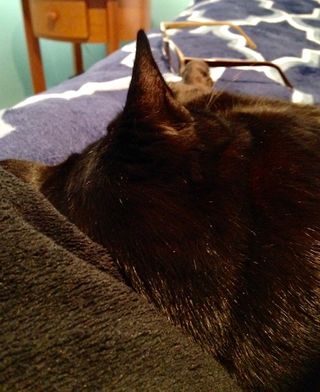Sleep
The Benefits of Napping
The benefits of a catnap improve mood, cognition and working memory.
Posted February 18, 2011

If there was a contest for napping, I'd take first place. I can nap anywhere, anytime. It's one of my many talents. Even my cat's in awe of my skills.
I easily fall into this semiconscious place where I'm not sound asleep but I'm not fully awake either. I can ease out of this meditative slumber without a jarring effect - and when I emerge from my nap, some 20 minutes later, I feel revived.
The Science of Napping
According to a 2009 report by the Pew Research Center, a third of U.S. adults nap on any given day. And the benefits of napping have been well documented. Research shows how a nap can promote physical well-being, improve mood and memory, re-energize and sharpen senses. Studies show that intellectual performance improves and accuracy in work performance increases too. In fact, fMRI's of nappers showed that brain activity remained higher throughout the day than for those who didn't nap. Furthermore, falling into a light sleep can be meditative. As you nap, the streams of thoughts and feelings can gel together in ways that doesn't happen when you're in a deep sleep.
Benefits and Bummers
When you sleep under normal circumstances, your brain cycles through several different stages of Delta, Theta, Alpha, Beta, and Gamma sleep waves. You drift from one stage of sleep to another - from light sleep to deeper sleep, to REM sleep, to wakefulness and so on. Delta and Theta waves are known as Sleep I and Sleep II stages, and are light stages of sleep. So, the key to napping is not to fall into the deeper stages of sleep. That's why a 15 to 30 minute nap is key. Napping more than that will leave you cranky.
It's important to keep a healthy nighttime sleep schedule if you're a catnapper. It's even more important if you have a mood disorder to keep track of your sleep cycle. Children and adults with unipolar or bipolar disorders often report sleeping too little or too much as an issue. For me, living with depression leaves me fatigued a lot - so I need my midday nap to make it through the day. It doesn't interfere with my sleeping at night, and if it did, I'd have to make adjustments.
Modern Napping
The catnap has gone modern with new names like Power Nap, Micro-Nap, Ultra-Nap and Metronap. In fact, nowadays you can find napping stations, napping pods, and even snoozing suites in airports, universities, workplaces, and malls. Self-proclaimed nappers like Albert Einstein, Leonardo Da Vinci , Thomas Edison, Winston Churchill, Johannes Brahms, John D. Rockefeller, Eleanor Roosevelt, Gene Autry, Nikola Tesla, Bill Clinton, John F. Kennedy, Napoleon Bonaparte, Salvador Dali and Sylvester Stallone make grabbing a few winks cool.
So, science says we should embrace the siesta. Napping is not just for the young and the old. It can be a good thing for many.


